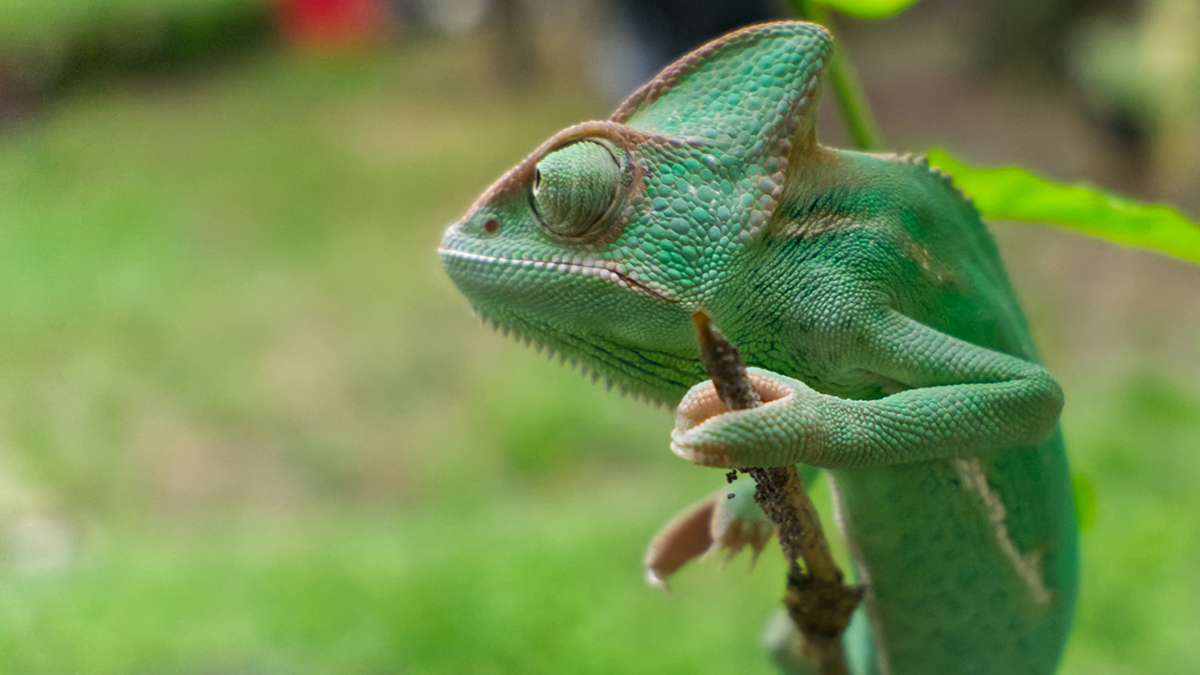
Species Overview
- Common Names: Veiled Chameleon
- Scientific Name: Chamaeleo calyptratus
- Distribution: Saudi Arabia, Yemen & surrounding areas
- Adult Size: 8-18”
- Life Expectancy: Males: 6–8 years; Females: 4-6 years
Veiled Chameleons are among the most popular chameleon species kept as pets. The veiled chameleon is a beautiful large chameleon species with fascinating behaviors. Chameleons require daily care and are considered higher maintenance than many other reptiles. Veiled Chameleons are an excellent choice for beginning chameleon hobbyists, yet are challenging for a beginning reptile keeper. Captive-bred Veiled Chameleons are readily available and always recommended over wild-caught animals.
About the Veiled Chameleon
Veiled Chameleon Pet Care: Habitat Set-Up
Habitat
- Zoo Med’s Reptibreeze® Open Air Screen Cages perfectly match Veiled Chameleons.
- Iguanarium® is an excellent choice for adult Veiled Chameleons.
- Provide plenty of climbing branches and broadleaf plants for cover and climbing opportunities.
- Be sure that any live plants used are non-toxic because Veiled Chameleons will occasionally eat plants.
- Offer branches of varying sizes to help your growing chameleon develop a firm grip.
Heating
- Daytime Terrarium Temperature: 72-80° F
- Basking Spot: 85-90° F
- Nighttime Temperature: Above 50° F
- Zoo Med’s Basking Spot Lamp™, PowerSun®, and Repti Halogen™ Lamps are excellent choices for heating chameleon enclosures.
- Chameleons prefer a drop in temperature at night. We recommend a low-wattage heat bulb such as a Nightlight Red or our Nocturnal Infrared Heat Lamp.
Lighting
- UVB Lighting is essential for chameleons to process calcium in captivity.
- Zoo Med’s ReptSun® 5.0 or 10.0 Linear or Compact Fluorescent Lamps are a great choice for providing chameleons with UVB. The PowerSun® is an excellent way to provide both UVB and Heat all in one lamp.
- Chameleons will develop serious health problems like Metabolic Bone Disease (MBD) without UVB lighting.
- UVB Lighting should be left on for 10-12 hours daily and turned off at night.
Substrates
- Cage carpeting, such as Zoo Med’s Eco Carpet™, is the most comfortable substrate to maintain chameleons on.
- Strongly recommended that hatchling chameleons not be kept on any loose substrate. Eco Carpet™ is the safest and cleanest choice for young chameleons.
- ReptiBark®, Forest Floor™, and Eco Earth® are adult nesting substrates. All enclosures that house adult females must provide a nest box with at least 4” substrate.
Veiled Chameleon Pet Care: Temperament
- These chameleons are unsuitable pets for small children or novice lizard owners due to their complex needs and susceptibility to stress (especially while handling them). While they are usually quite docile towards people, regular handling isn’t a good idea.
- Veiled chameleons are territorial and aggressive to other chameleons, so they should always be housed individually. These pets are better suited to being watched rather than handled.
Diet and Nutrition
- Veiled Chameleons are insectivorous animals and will require a varied diet of insects.
- Insects such as crickets and mealworms are a proper staple diet. We recommend “gut-loading” your feeder insects with Cricket Care™ before feeding your animals.
- Zoo Med’s ReptiCalcium® and ReptiVite™ with Vitamin D should be added to food as directed. Calcium and multivitamins are critical to keeping your growing chameleon healthy and active.
- Veiled Chameleons occasionally will eat leafy greens as offered.
- Feed Daily and remove all uneaten insects from the enclosure after feedings.
Water
- Veiled Chameleons prefer to drink or lap water from leaves. To replicate this in captivity, try offering a drip or misting system.
- Zoo Med offers several products that will allow you to provide your chameleon with water. The Big Dripper ™ will let you drip water onto leaves above the cage.
- The Habba Mist® will provide a scheduled misting of your terrarium.
- Always add ReptSafe™ Water Conditioner to your tap water to remove Chlorine and Chloramines.
Pet Safety
- Use caution when handling pets, and remember they may bite or scratch (especially when stressed).
- Supervise children around pets.
- ALL ANIMALS can potentially carry viral, bacterial, fungal, and parasitic diseases contagious to humans.
- Thoroughly wash your hands with warm, soapy water before and after contact with any pet or its habitat.
- Adults should assist children with handwashing after contact with a pet, its habitat, or aquarium water.
Related Searches
Reptile Care